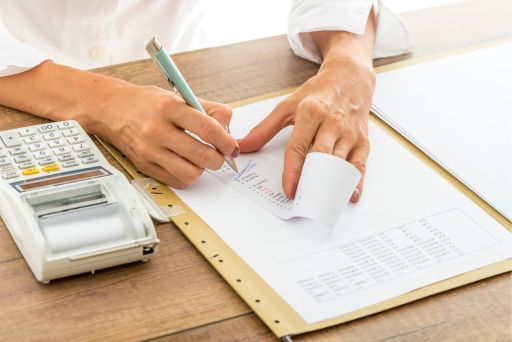Tax season is a time of year that many people dread, but it doesn’t have to be so anxiety-inducing. One of the most effective ways to ease the stress of tax filing during tax time and potentially save money is by diligently saving your paper receipts. Whether you’re a small business owner, self-employed individual, or simply a taxpayer looking to maximize deductions, understanding which receipts to keep and how to manage them is crucial. In this comprehensive guide, we’ll explore why it is important to save receipts for taxes and provide you with valuable tips and strategies to streamline the process.
Learn Which Small Business Receipts to Keep
When it comes to small businesses, accurate record-keeping is essential. Keeping track of your expenses through receipts can help you determine your taxable income and ultimately reduce your tax liability from your gross income. But which receipts should you keep? Here are some common types of receipts that you should definitely hold onto for tax purposes:

Receipts To Keep for Small-Business and Self-Employment Taxes
Expense Receipts
Expense receipts refer to documentation or records of expenditures made by individuals or businesses for various purposes.
These are vital records of expenditures incurred by individuals or businesses. They serve as tangible proof of various types of spending, including personal purchases, business expenses, travel expenses, transportation expenses and charitable donations. These receipts are instrumental in budgeting, financial record, and, most importantly, for tax purposes.
Taxpayers rely on it to determine their deductible expenses, which can significantly reduce their taxable income. Properly organizing, categorizing, and retaining these receipts is essential for maintaining financial accuracy and compliance with tax regulations.
Purchase Receipts
Purchase receipts are essential financial documents that provide a detailed record of items acquired for business purposes, such as inventory, equipment, or assets. These receipts play a pivotal role in a company’s financial management by serving as concrete evidence of business-related transactions. They help in accurately calculating the total cost of acquiring assets, which is vital for determining a business’s financial health and evaluating its profitability.
Moreover, they are invaluable when it comes to tax writes-off and asset depreciation. Businesses can claim deductions on the cost of purchased business assets, or office expenses gradually reducing their taxable income over time. The information contained in these receipts is instrumental in ensuring accurate financial reporting, complying with tax regulations, and optimizing tax strategies.
Furthermore, purchase receipts facilitate comprehensive asset management and tracking. They allow businesses to keep an updated record of their assets, which is crucial for assessing their value and depreciation over time.
Childcare Expenses
You might be eligible to receive a tax credit for expenses related to caring for your child or dependent. These expenses can include payments made to a babysitter, daycare, day camp, after-school program, or another care provider. If the care is provided in your home, you may also qualify for additional expenses, such as hiring a maid, cook, or housekeeper to care for your child or dependent.
To qualify for this credit, you must have paid these expenses to allow yourself (and your spouse if you’re married) to either work or actively search for work. Both you and your spouse need to have earned income, unless your spouse is disabled or a full-time student, in order for these expenses to be eligible.
You can claim this credit if you have one of the following types of dependents:
- A child under 13 years old whom you claim as a dependent.
- A disabled spouse or dependent who is unable to care for themselves due to physical or mental reasons

Unreimbursed Work-Related Expenses:
If your job requires expenses that your employer doesn’t reimburse, these receipts can be valuable for tax deductions.
If you’re someone who itemizes deductions and anticipates work-related costs, it’s advisable to keep a record of those receipts for taxes. These tax professional deductions encompass expenses like tools, equipment, supplies, mandatory work uniforms unsuitable for non-work settings, protective gear, professional dues (such as union memberships or professional organization fees), subscriptions to professional publications, and even costs incurred during a job search within your current field.
Moreover, you had the potential to deduct expenses associated with specific training and educational endeavors relevant to your profession, as well as expenses linked to using your home for business purposes and personal vehicle mileage related to work duties (excluding commuting). It’s worth noting that some individual states still permit deductions for these types of expenses
Personal Income Tax Receipts:
Receipts to Retain for Personal Income Tax Records It’s not just business owners who should be diligent about preserving receipts; many taxpayers are eligible for tax writes-off that may necessitate proof in the form of receipts.
Additionally, make sure to keep the following documents:
- Receipts for purchases that qualify for special tax benefits, like those eligible for an educator expense deduction.
- Supporting receipts and documentation for eligible home improvement expenses on real estate.
- Receipts for qualified medical expenses and dental costs, including out-of-pocket payments for medical services, hospital stays, prescription medications, and expenditures associated with traveling to and from medical appointments, which encompass parking fees and tolls.
- Documentation verifying tax-deductible donations, regardless of the amount, in the form of cash, checks, or other monetary gifts.
- Receipts for dependent care expenses if you’re a working parent or if you incurred these costs while actively seeking employment.
- Receipts for energy-saving home improvement projects.
- Receipts indicating state and local sales tax payments made on purchases, particularly if the sales tax surpasses your state income tax withholding or if you reside in a state with no personal income tax.
- Receipts for qualified education expenses, such as tuition, fees, books, and supplies.
By keeping these receipts, you can better document your expenses, leading to potential tax savings.
Business Expense Receipts
Your business expenses encompass the various costs associated with operating your business, excluding your purchases. Seek expert guidance on which receipts for taxes are essential for your business tax records.
At times, simply having canceled checks may not suffice as evidence for a deduction, as explained by Lee. For instance, a check written to Costco may not serve as proof of a business expense, as it could be for groceries or personal items.
Similarly, credit card charges related to a business trip to Maui might appear to be a vacation unless you can furnish additional documentation supporting the business purpose. Therefore, it’s crucial to save receipts, business conference flyers, and other relevant documents to substantiate the business nature of these expenses, as advised by Lee.
Here are the types of tax documents you should retain for tax purposes:
- Canceled checks
- Cash register tapes
- Account statements
- Credit card receipts and statements
- Petty cash slips
- Invoices

Donations to Charitable Causes
Whether you’ve given clothing or food supplies to a nearby shelter or provided monetary contributions to support veterans, you have the opportunity to claim tax deductible donations. It’s important to note that deductions can only be claimed for donations made to organizations that hold tax-exempt status.
Specifically, if an organization possesses a 501(c)(3) designation, you are eligible to deduct your contributions. In cases where the organization doesn’t have this status, you can still claim deductions, but you must first confirm with the IRS. If required, don’t forget to request a receipt, especially if you intend to itemize your tax return.
Healthcare Expenses
Make sure to retain documents reflecting proof of paid bills or medical expenses for yourself, your spouse, your children, or any other individuals you claim as dependents.
Furthermore, you can also claim deductions for various medical items, including but not limited to medical equipment, breast pumps, eyeglasses, contact lenses, and more.
In fact, the IRS includes the following medical expenses in a comprehensive list of eligible tax deductions:
- Expenses for Guide Dogs
- Costs Associated with Medical Examinations and Tests
- Acupuncture and Chiropractic Services
- Occupational and Physical Therapy
- Sessions with Psychiatrists and Psychologists
- Weight-Loss Programs (Only if Prescribed by a Doctor for a Diagnosed Condition)
- Nursing Care
- Hospitalization Costs
- Expenses for Transportation to and from Medical Appointments
- Lodging Expenses for Out-of-Town Medical Treatment
Other Expenses
There are a few more types of receipts that you should consider retaining, depending on your individual tax circumstances. In certain cases, it can be advantageous to claim a deduction for the state and local sales tax you paid on your itemized deductions, instead of the total amount of state and local income taxes you incurred throughout the year.
Typically, this deduction for sales tax is most beneficial for individuals who made one or more significant purchases during the tax year, such as a car, boat, RV, or home extension, resulting in a higher sum of sales tax paid compared to their income tax withholding.
It is also relevant when you reside in a state that does not impose a state income tax. If your situation aligns with this description, it’s prudent to retain all sales receipts.
Saving receipts for taxes is a crucial part of responsible financial management . By understanding which receipts to keep, embracing digital record-keeping, and maintaining an organized filing system, you can not only make tax time less stressful but also potentially unlock significant tax savings. Remember that while this guide provides valuable tips and strategies, it’s always wise to consult with a tax professional for personalized advice tailored to your specific circumstances.
Stress-Free Tax Management Awaits You at Vyde!
Say farewell to tax worries and unexpected costs. With Vyde, experience seamless tax completion, catch-up bookkeeping, and overdue tax assistance. Our commitment to year-round service guarantees maximum savings on your tax bill. Don’t wait – let Vyde take the helm of your business taxes today!
Frequently Asked Questions:
-
Why is it important to save receipts for tax purposes?
Saving receipts is crucial for tax purposes because they serve as proof of your business and personal expenditures. These receipts can help you determine your taxable income, claim deductions, and potentially reduce your tax liability, leading to significant tax savings. -
What types of receipts should small business owners keep for tax season?
Small business owners should keep receipts for all business expenses, including expense receipts, purchase receipts for items like inventory and equipment, and any receipts for business-related travel. Additionally, documentation for unreimbursed work-related expenses, charitable donations, and healthcare expenses should be retained. -
Can personal expenses ever be deducted on taxes?
Yes, certain personal expenses can be deducted, such as qualified medical and dental costs, childcare expenses for working parents or job seekers, donations to charitable causes, and significant purchases that may offer special tax benefits or credits. -
How long should I keep my tax receipts?
The IRS recommends keeping tax records for at least three years from the date you filed your original return or two years from the date you paid the tax, whichever is later. However, if you file a claim for a loss from worthless securities or bad debt deduction, keep records for seven years. -
What is Vyde, and how can it assist with tax management?
Vyde is a service that offers seamless tax completion, catch-up bookkeeping, and assistance with overdue taxes. It provides year-round service to ensure maximum savings on your tax bill, aiming to make tax management stress-free for its clients.

